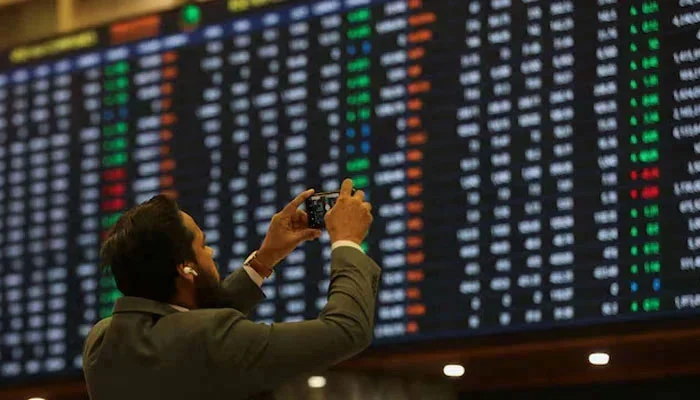PSX
A brokerage firm has confirmed that the Pakistan Stock Exchange (PSX) witnessed its second-best Ramazan returns in 2025 since 2015. According to a note by Arif Habib Limited, the benchmark KSE-100 index recorded a 5.2% return during Ramazan, marking a significant improvement in market performance.
The primary drivers behind the stock market’s bullish trend during the month were the staff-level agreement (SLA) with the International Monetary Fund (IMF) and the government’s progress on its circular debt resolution plan.
Media reports suggested that substantial advancements had been made in addressing circular debt, with the government working on measures to reduce electricity prices, further fueling investor confidence.
The market’s positive momentum was largely influenced by the SLA reached following the first review under the $7 billion Extended Fund Facility. This agreement enabled the release of the second tranche of $1.1 billion, boosting economic sentiment. Additionally, a new 28-month $1.3 billion arrangement under the Resilience and Sustainability Facility (RSF) was secured, reinforcing the country’s financial stability.
Pakistan’s economic indicators also reflected a mixed trend during this period. The country’s GDP grew by 1.73% year-on-year in the second quarter of FY25, while the overall GDP growth for the first half of FY25 stood at 1.54%, slightly lower than the 2.33% recorded in the same period of the previous fiscal year.
Meanwhile, the government raised Rs640 billion through a T-bill auction, slightly below the target of Rs650 billion. Despite the shortfall, investor confidence in government securities remained stable.
Arif Habib Limited also pointed out that the strongest Ramazan performance was recorded in 2024 when the KSE-100 index posted a remarkable return of 6.9%. On average, the stock market has delivered a return of 1.3% during Ramazan over the years.
According to Topline Securities, several key economic developments during Ramazan had a positive impact on the stock market. These included a lower-than-expected inflation reading for February, the continuation of an unchanged monetary policy, and a sharp increase in remittances, which totaled $3.1 billion—marking a 39% year-on-year rise.
The PSX remained in a positive trajectory throughout March and Ramazan. The KSE-100 index opened the month at 113,499 points and reached an intra-month high of 119,422 points before dropping to a low of 111,717 points. By the end of the month, the index closed at 117,807 points, registering a net gain of 4,555 points, or 4.02%. However, on a weekly basis, the market recorded a marginal decline of 635 points, or 0.5%.
Topline Securities further reported that car sales in February 2025 stood at 12,084 units, reflecting a 24% year-on-year increase, though a 29% decline on a month-on-month basis. Additionally, Pakistan’s current account recorded a $12 million deficit for February, but the overall current account balance for the first eight months of FY25 remained in surplus, amounting to $691 million.
Trading activity at the PSX also saw significant growth. The average daily traded volume stood at 366 million shares, while the average daily traded value reached PKR 24 billion. These figures indicated strong investor participation and improved market liquidity throughout the month.
With positive economic indicators and key policy decisions supporting investor sentiment, Ramazan 2025 emerged as one of the most profitable periods for the PSX in recent years, reinforcing confidence in Pakistan’s financial markets.










